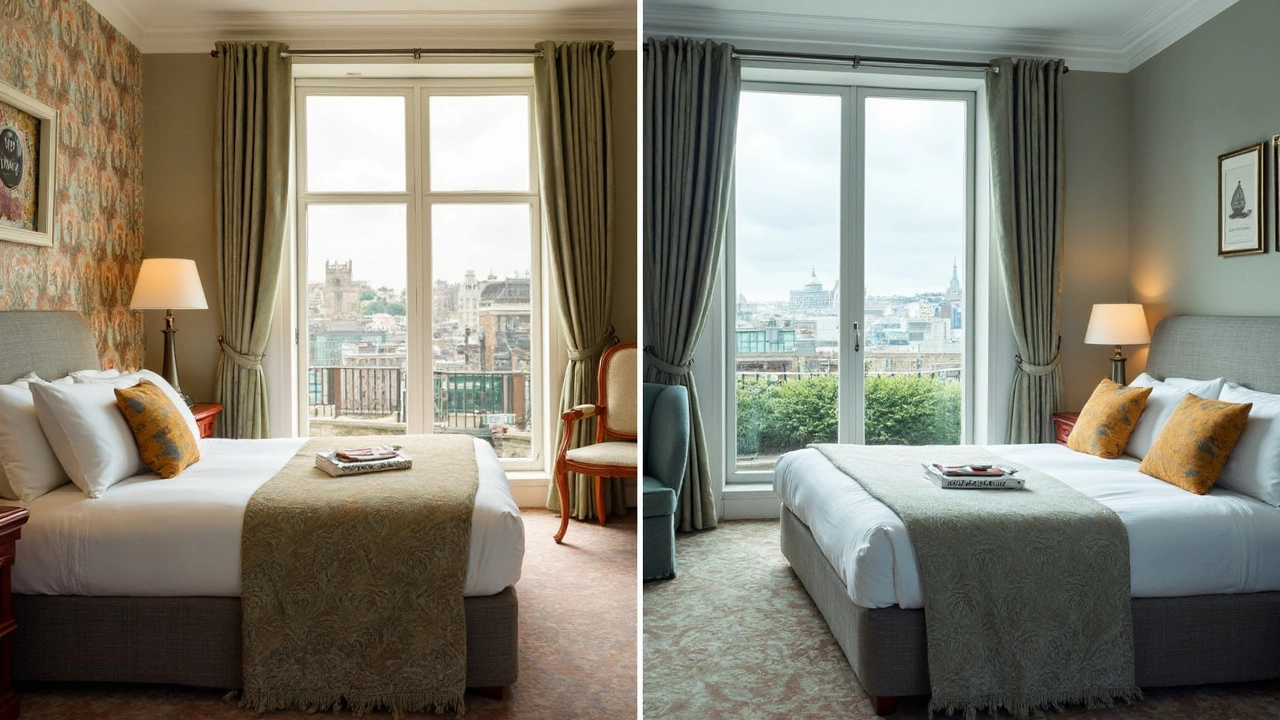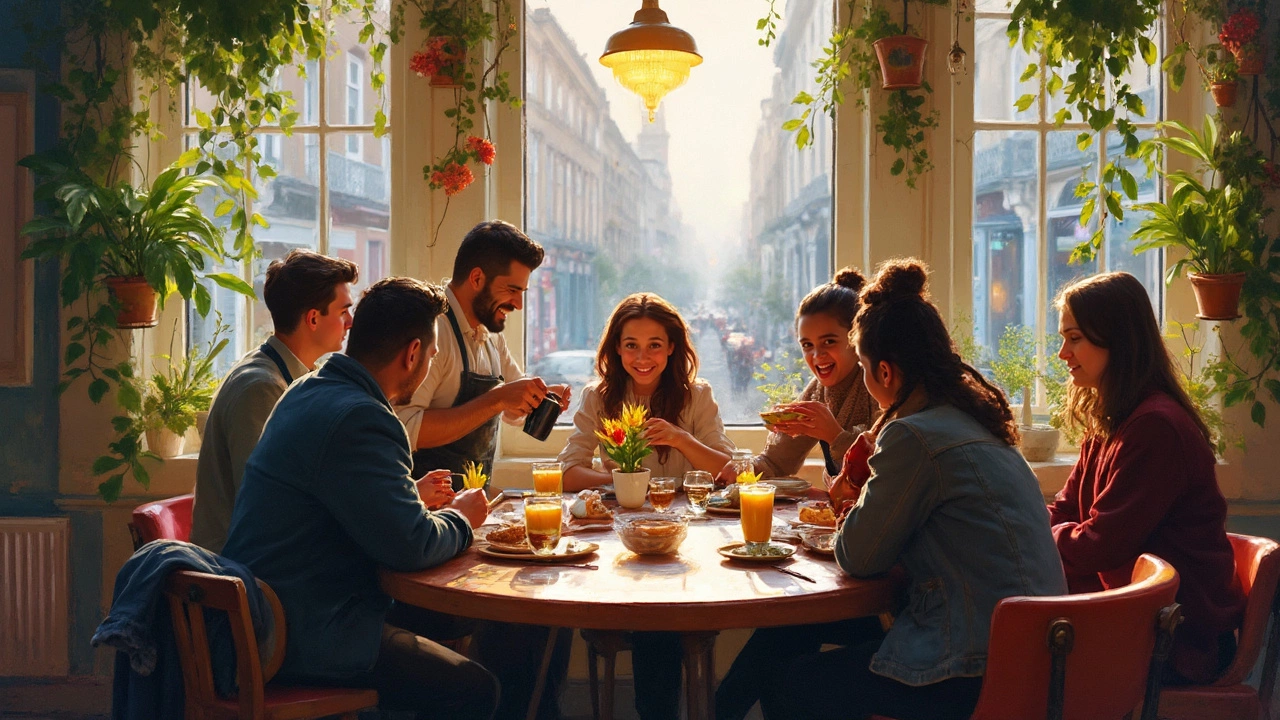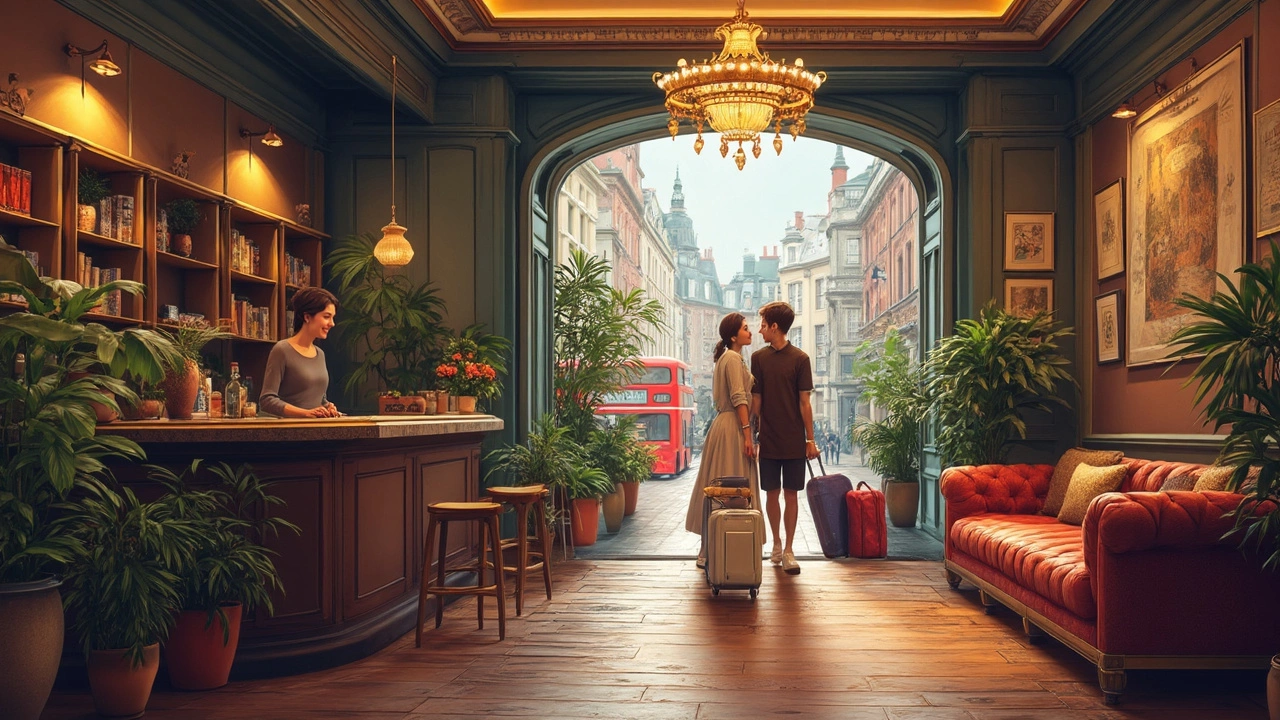Boutique Hotels vs Regular Hotels: What Sets Them Apart?
19 Jun, 2025You know that feeling when you walk into a hotel and it just feels different—like it's got its own vibe? That's probably a boutique hotel. They're popping up everywhere and stealing the spotlight from the big chains. But what actually makes a hotel 'boutique'—and why does it matter for your trip?
It's not just about size or price. Boutique hotels are the rebels of the hotel world. They usually have fewer rooms, custom interiors, and a personality you can't find anywhere else. Regular hotels, on the other hand, play it safe with tried-and-true comforts, predictable service, and the same look from one city to the next. Both have their perks. If you're stuck choosing between them, the trick is knowing what really matters for your stay. Let’s break down where these differences actually show up, so you can pick the perfect spot for your next trip—whether you’re hunting for a one-of-a-kind experience or just want a smooth, no-surprises stay.
- Defining Boutique vs Regular Hotels
- Design and Atmosphere
- Guest Experience and Service
- Unique Features and Local Flavor
- Who Should Choose Which?
Defining Boutique vs Regular Hotels
If you’ve ever wondered what separates a boutique hotel from your average hotel chain, here’s a straight answer: it mostly comes down to size, personality, and how much attention is paid to unique details. Boutique hotels are usually smaller—think 10 to 100 rooms—so you won’t get lost in the shuffle. Regular hotels are all about consistency, offering the same experience whether you’re in New York or Tokyo.
A boutique hotel is independent or part of a small brand. What’s more, they want you to feel like you’re someplace special—with custom decor, quirky touches, and a focus on local culture. Big brand hotels—like Hilton, Marriott, or Holiday Inn—stick to a playbook so you know what to expect at check-in, from room layouts to the breakfast buffet.
Here’s a quick side-by-side to put it in black and white:
| Boutique Hotel | Regular Hotel | |
|---|---|---|
| Room Count | 10-100 | 100+ |
| Ownership | Independent/small chain | Large chain/corporate |
| Design | Unique, themed | Standardized |
| Service | Personalized | Predictable |
| Atmosphere | Quirky, local flair | Traditional |
Some hotel consultants estimate only about 5% of hotels worldwide are boutique, but they punch way above their weight in buzz—just check your Instagram feed. Fun fact: the first modern “boutique hotel” label came from Steve Rubell, co-owner of New York’s Morgans Hotel back in 1984. He compared his 150-room spot to a little boutique shop, not a big department store.
If you want something dependable, a regular hotel covers your bases. If you want a hotel that sticks in your memory (and your camera roll), boutique is probably your jam. This definition helps you figure out which fits your style—or your mood for this trip.
Design and Atmosphere
Here’s where you really start to notice a gap between a boutique hotel and a regular hotel. Boutique hotels take a ton of pride in their look and atmosphere—they want you to feel something when you walk in. You might find mid-century modern art, handpicked local décor, or furniture that looks like it was found in a cool vintage shop. Every boutique spot tries to stand out and feel one-of-a-kind. Some even change up art or furniture depending on the season or the owner’s mood.
Regular hotels lean heavy on consistency—imagine identical framed prints and matching beige carpets in every location. They follow a playbook, and you pretty much know what you’re getting, whether you check in at the airport or downtown. That’s not a knock; for some travelers, the predictability is comforting, especially if you’re on the move for work or with kids.
Boutique hotels are often smaller, averaging anywhere from 10 to 100 rooms, which means the atmosphere tends to be quieter and more personal. Take Ace Hotel in New York or The Hoxton in Paris. Each room has its own flavor, from record players and unique light fixtures to quirky minibars that stock local craft beer instead of just the usual sodas.
Here’s a quick comparison to show what you might actually notice:
| Feature | Boutique Hotel | Regular Hotel |
|---|---|---|
| Interior Design | Custom, theme-driven, unpredictable | Standardized, brand-wide uniformity |
| Lobby Feel | Cozy, feels like a social living room | Functional, practical, can feel generic |
| Artwork | Often local or original | Mass-produced and corporate approved |
| Furniture | Picked for character | Picked for durability |
When you book a boutique, you’ll probably find it in a building with some history or a former warehouse with exposed brick. Regular hotels usually build from scratch so layouts look the same across the brand. The bottom line? If you want your hotel to feel as memorable as the city you’re visiting, boutiques have an edge.

Guest Experience and Service
If you ever stayed at a boutique hotel, you probably noticed staff remember your name, maybe even your coffee order. Service often feels personal, almost like you’re staying with friends who care about the details. This is no accident. Most boutique hotels have fewer rooms—usually under 100—so staff focus more on each guest. Regular hotels, especially big chains, do things a little differently. There are set routines, clear policies, and everything is predictable—which can help if you want consistency wherever you travel.
In a recent survey by Statista, about 62% of boutique hotel guests said the main reason they choose these places is for the personal attention and unique touches. That might mean the front desk giving you dinner suggestions that aren’t in the guidebooks, or a welcome gift waiting in your room if it’s your birthday.
- Boutique hotels: Staff usually have more freedom to tailor your stay. They might upgrade your room just because it's your anniversary, or surprise you with local snacks.
- Regular hotels: Employees typically follow strict service protocols. There are loyalty points, standard upgrades, and few surprises—good if you travel a lot for business and hate unexpected changes.
Here’s a quick look at what you might get at each:
| Service Element | Boutique Hotel | Regular Hotel |
|---|---|---|
| Check-In Experience | Personalized, flexible | Standardized, quick |
| Room Requests | Highly adaptable | Policy-driven |
| Special Occasions | Celebrated with extras | Noted, but less personalized |
| Local Recommendations | Insider tips | Generic brochures |
If you enjoy little surprises and staff who want to make your stay special, boutique hotels nail it. If you just need quick service and everything to work the same every time, regular hotels are the way to go. The bottom line: the vibe you want matters most.
Unique Features and Local Flavor
This is where boutique hotels really turn on the charm. Every spot tries to outdo the next with fresh ideas, and you feel it the second you step inside. Most boutique hotels team up with local artists, designers, and even coffee roasters. Think murals in the lobby by a nearby muralist, rooms filled with art from the city, or custom furniture you won’t find at IKEA. They might even host events for local musicians or run pop-up food tastings from the neighborhood’s rising chefs. You just don’t see that stuff at big chain hotels—they tend to stick to a formula.
Boutique hotels want you to feel where you are, not just tick off a city on your travel list. It’s not just about having a stylish lobby. One fun example: In Amsterdam, The Dylan places fresh tulips and locally made stroopwafels in every room. A hotel like The Goodtime in Miami pumps upbeat local music and serves Cuban-inspired cocktails—so you know exactly what city you’re in. You’ll rarely see the same wallpaper, menu, or even shampoo brand across two boutique hotel stays, because each is designed (often literally) to reflect that unique neighborhood vibe.
If you’re someone who appreciates little surprises, or you like to feel plugged in to the local scene, this is right up your alley. Here are some common features you’ll spot in many boutique hotels:
- Locally sourced products in the minibar (think craft snacks, local wine or beer)
- Custom decor and furniture, not mass-produced
- Neighborhood guides written by staff who actually live there
- Collaborations with nearby shops, galleries, or fitness studios
- One-off experiences—rooftop yoga, city tours led by locals, or private tastings
Let’s take a look at how often some of these local features pop up compared to regular hotels:
| Feature | Boutique Hotels (%) | Regular Hotels (%) |
|---|---|---|
| Local Art Displays | 72 | 18 |
| Locally Sourced Food/Drinks | 78 | 29 |
| Neighborhood Experience Guides | 63 | 12 |
| Unique Decor per Property | 91 | 32 |
These numbers make it obvious: If you want a stay that’s actually shaped by its city, boutique hotels have regular hotels beat, hands down.

Who Should Choose Which?
If you’re still weighing your options, knowing what you personally need out of a place makes all the difference. It really comes down to what kind of traveler you are, how you roll, and what you want out of your stay.
Here’s the breakdown:
- Pick a boutique hotel if you love personality, individual style, and want a story to tell. You’ll often get cool design, local art, and a real sense of place—perfect for couples, solo travelers, or anyone bored by chains. Boutique properties are typically smaller (fewer than 100 rooms is pretty standard), and you’re more likely to meet staff who actually learn your name and make local suggestions you won’t find on big booking sites.
- Opt for a regular hotel when you need predictability, lots of amenities, and conveniences like 24-hour room service, loyalty programs, and business facilities. Families, business travelers, or anyone with a tight schedule will appreciate that you know exactly what to expect before you walk in the door. Major chains like Hilton and Marriott set clear standards—so if you want that reliability, this is your best bet.
Budget can swing things too. You’ll often pay more at a boutique spot because of the extras: curated rooms, custom toiletries, sometimes even things like wine hours or exclusive local tours. But deals do exist, especially in less crowded destinations or during off-peak times.
Quick tip—if you thrive on Instagrammable moments and a neighborhood feel, boutique hotels have the edge. But if you need wheelchair access, onsite parking, or late-night burgers, those regular hotels usually check all the boxes. Neither is automatically better—it’s about matching the hotel to your trip, not the other way around.

 by
by